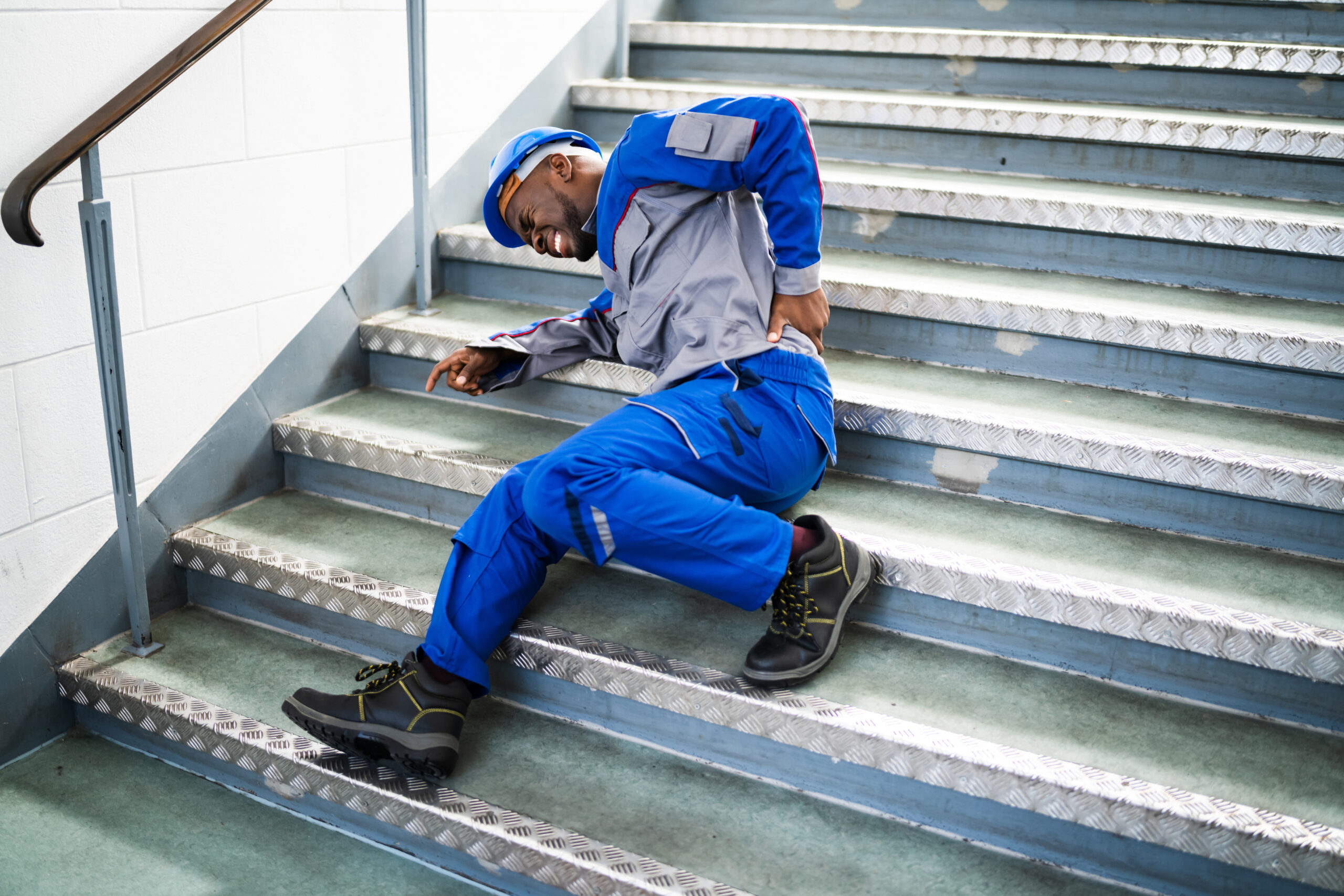
Slips, Trips, and Falls at Work
When you fall at work and suffer injuries, you can claim workers’ compensation benefits. If the hazard that caused your fall was the fault of a third party—someone other than you, your employer, or a fellow employee—you could sue that third party for the losses workers’ compensation doesn’t cover.
Employees who suffer injuries from trips, slips, and falls at work should immediately consult a lawyer at Shook & Stone. Our experienced slip and fall attorneys could evaluate your situation and discuss the legal options available in your specific case.
Common Slip and Fall Injuries
Many falls only injure our ego, so sometimes, people don’t realize how serious a fall can be. Slips, trips, or falls on a level surface often cause painful and debilitating injuries like fractures—especially to the face, forearm, and lower leg. Lingering soft tissue injuries like neck and shoulder hyperextension also can result from falls. If you hit your head, you might suffer a concussion.
Falls down steps or from a height can be especially serious. Fractures of the limbs, shoulders, ribs, pelvis, back, and skull are possible. Sometimes, fractures of the ribs or pelvis damage the internal organs and cause severe bleeding. Head and facial trauma can result from these falls, including concussions and moderate or severe traumatic brain injuries. Damage to the spinal cord leading to paralysis is a possibility.
Whatever your injuries, workers’ compensation provides free medical treatment if the fall happened in the course of your employment. Nevada Revised Statutes § 616C.087 requires every workers’ compensation insurer or self-insured employer to maintain a list of medical providers authorized to provide treatment under the workers’ compensation program. Seek an immediate evaluation from a provider on the list after a fall, even if you’re not experiencing symptoms.
Take Advantage of Your Workers’ Compensation Benefits
You are entitled to free medical treatment and a partial wage when an approved medical professional confirms you suffered a work-related injury. You will receive treatment until your symptoms have resolved or you reach the point of maximum medical improvement (MMI)—the point where your doctor doesn’t believe more treatment will benefit you. If the injury interferes with your functioning, you might be eligible for permanent disability benefits after a fall.
When injuries from a fall prevent you from working, workers’ compensation will pay two-thirds of your average weekly wage while you stay home. If you can resume partial duties or work at a different job, worker’s compensation will pay two-thirds of the difference between the wages you made before the fall and the wages you earn on modified duty.
Disputes might arise at several points in the process. For example, perhaps your employer is miscalculating your pre-injury average weekly wage. You might disagree with a doctor’s determination of your readiness to return to work or their opinion that you’ve reached MMI. You might dispute a disability rating that determines the permanent benefits you’re entitled to receive. A Shook & Stone attorney can help you appeal these decisions, refer you to other medical professionals for a second opinion, and ensure you receive everything you deserve from the workers’ compensation benefits you earned.
A Lawsuit Is Possible When a Third Party Could Be Liable
A work-related accident could be the fault of a third party, and if so, you could have a personal injury claim against them. You can sue for:
- Pain and suffering
- Incidental expenses related to the injury
- Any medical costs workers’ compensation didn’t cover
- The portion of your wages workers’ compensation doesn’t pay
Your pain and suffering damages are losses like emotional trauma, embarrassment, diminished enjoyment of life, physical pain, disability, and scarring.
When you engage a well-practiced lawyer at Shook & Stone to represent you in a workplace accident case, they will immediately investigate to determine whether a third party might be at least partially responsible. Third-party liability is most likely in cases such as the following:
- Injury occurred off the employer’s premises
- When a defective product causes a slip, trip, or fall
- Injury resulted from a vehicle accident, and another driver was at fault
- An independent contractor working in physical proximity to the injured person caused or contributed to the hazard that caused the fall
- Shoddy work by someone other than the employer, like a tiler or carpet installer, created the hazard
When you seek compensation in a third-party lawsuit, you must prove the third party’s actions or inactions caused the hazard that led to your fall. You also prove your injuries are connected to the fall—that is one reason why it is so critical to get immediate medical attention. If you can provide the necessary evidence, most third-party claims settle before trial, and many cases end in an appropriate settlement without the need to even file a lawsuit.
Consult an Attorney at Shook & Stone After a Workplace Fall
A serious fall can lead to permanent injuries and keep you out of work for an extended period. Depending on the injuries and your job, you might never return to your old job. Even when injuries are less severe, a fall can significantly impact your income and lifestyle.
Explore all the possibilities for compensation after a slip, trip, and fall at work. The dedicated team of lawyers at Shook & Stone can help you get the maximum available from workers’ compensation and other responsible parties. Call today to set up a free consultation.
 Sunny
Sunny Understanding Social Security Disability for Mental Health Conditions
Understanding Social Security Disability for Mental Health Conditions 